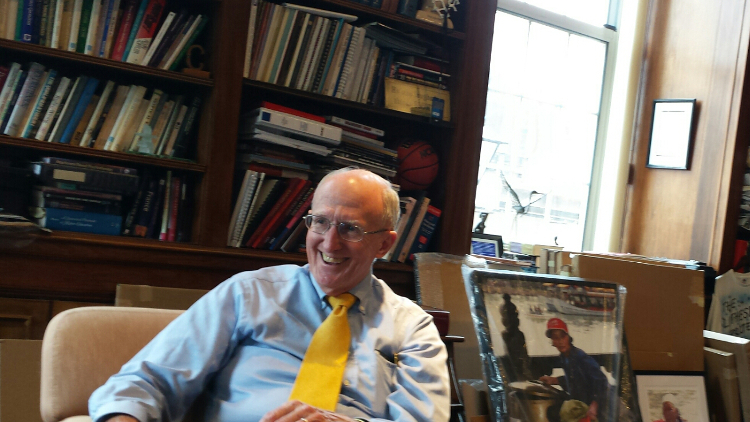After steering Adelphi University for 15 years as president, Robert Scott leaves the institution in far better shape than he found it. To call what he did on the Garden City campus a great turnaround would not be hype. The fate of this Long Island gem of higher learning looked dubious at best when he took over in July 2000.
“I was the sixth president in three and a half years,” says Scott, who’d previously been president of Ramapo College, a public liberal arts institution in New Jersey, and deputy commissioner of higher education for both New Jersey and Indiana.
Freshmen enrollment had dropped in half and half the resident halls were empty. Adelphi’s trustees were discussing whether to rent them out to another school or even merge with another institution. They were also considering whether to drop majors in philosophy, anthropology, sociology, physics and chemistry.
“When I got into the mix, I said to them, ‘If you want a new president, don’t do any of those things; and if you do them, you’re not going to get a new president,’” Scott recalled telling the trustees. They agreed with him and postponed taking these draconian measures. Their prudence was well rewarded.
“Within three years we not only filled the dormitories, which had been half empty,” said Scott, “we made plans to build a new residence hall. Since then, we’ve built yet another one and renovated the others.”
Thursday’s commencement was Scott’s last as president. According to the university, he’s shaken more than 15,000 graduates’ hands. At a ceremony two years ago he awarded an honorary degree to Roosevelt rapper Chuck D, whose professors more likely remembered him as Carlton D. Ridenhour, class of 1984. After Scott vacates his office in July, Christine M. Riordan, currently the provost of the University of Kentucky, will become the first woman to lead Adelphi in its 118-year history.
Founded in 1863 as a private prep school in Brooklyn, Adelphi Academy didn’t start on the path to what it is today until 1893 when Charles H. Levermore became its leader. He established Adelphi College, a coeducational institution, three years later, thanks to a charter granted by the Board of Regents of the State of New York. Eventually the college split off from the prep school and moved to Garden City, a new planned community, where it broke ground on its future campus in 1928.
Early on, Adelphi established itself as an innovator in public health and the arts, establishing one of the first public nursing programs in the country under Mildred Montag as well as one of the first dance departments at an American university, becoming home to modern dance pioneer Ruth St. Denis and later choreographer and performer Paul Taylor.
The university’s graduates run the gamut, from Gary Dell’Abate, ’83, producer for The Howard Stern Show to Alice Hoffman, ’73, New York Times best-selling author, and Jonathan Larson, ’82, author of Pulitzer Prize-winning Broadway musical, RENT.
The roster also includes:
- Kevin Mawae, M.A. ’06, the former president of National Football League Players Association and a former New York Jet;
- Robert Darling, ’81, former White House physician to President Bill Clinton;
- Tom Donohue, M.B.A. ’65, president and CEO of the U.S. Chamber of Commerce;
- Carmen Ortiz, ’78, U.S. Attorney in Massachusetts;
- Charles Fuschillo, ’83, former NY State Senator;
- Gregory Meeks, ’75, the current U.S. Representative for New York’s 5th congressional district, which includes Queens and a sliver of Nassau.
During Scott’s tenure, undergraduate enrollment has grown nearly 65 percent with students from 45 countries and total enrollment has increased by 48 percent; 300 new faculty have been hired and dozens of new programs and services have been added, including internships in non-profit groups through the Community Fellow Program, which he initiated, and growing partnerships with the North Shore-LIJ Health System, Catholic Charities Diocese of Rockville Centre; and the Northport VA Medical Center. On his watch, he expanded the university’s honors college and launched the Levermore Global Scholars program, as well as getting Adelphi recognized as a non-governmental organization (NGO) by the UN’s department of public information. Its physics department has received funding from the National Science Foundation, NASA, the U.S. Environmental Protection Agency and the U.S. Department of Energy, to name a few. In a decade the endowment has tripled to more than $175 million and total assets have grown to $500 million.
In 2002, he oversaw the first new construction on the Garden City campus in more than 30 years. Since then, more than $250 million of construction and renovation has been completed, totaling more than 500,000 square feet. Right outside his office window, Scott could watch the new 100,000-square-foot Nexus Building and Welcome Center rise from the ground. Slated to open this fall, it will become the state-of-the-art home for the renamed College of Nursing and Public Health, as well as the Center for Health Innovation, including new labs and training facilities. It replaces the old school of nursing building which was dedicated in 1944 by Eleanor Roosevelt.
When he took office, he said he had a mantra.
“Enrollment is everybody’s job if everybody is to have a job,” he explained. “That meant everybody, whether it’s the front desk or the front of the classroom or the front of the line at commencement. Everybody had to think about enrollment.”
Today total enrollment is more than 8,000 students. This year, Adelphi had record numbers of applicants.
“Most come from the four counties of Long Island,” he joked, including Brooklyn and Queens as well as Nassau and Suffolk counties.
Scott said that 87 percent of those accepted get some student aid; 10 percent of the undergrads are from families with annual incomes less than $12,000; 25 percent are from families who earn $30,000 or less and 40 percent are from families who earn $60,000 or less.”
“Our tuition is 25 percent less than Hofstra and St. John’s,” said Scott. “This is a great progressive place.”
Today he says proudly that he leaves Adelphi University in “very strong shape.”
His legacy will certainly be remembered more fondly than one of his more notorious predecessors, Peter Diamandopoulos, who was fired in 1997 after serving 12 years. His turbulent tenure was tainted with conflict of interest allegations and concerns about his perks, which included an $80,000 Mercedes-Benz and a $1.5-million Manhattan apartment in addition to his on-campus house, as reported in Newsday. At his peak, Diamandopoulos was the second highest paid college president in America, earning more than half a million dollars annually.
Ahead of him on the salary list was then-Boston University president John Silber, who was also on the Adelphi board of trustees and a staunch defender of his compensation package. As an example of his lavish life style, at one point Diamandopoulos and Silber spent $455 on wine and cognac at a Manhattan venue and charged it to Adelphi. Perhaps they were discussing the finer points of Immanuel Kant, since Silber was a noted scholar of the modern German philosopher, but regardless, the faculty, staff and alumni had had enough. They filed a complaint with the New York attorney general, who turned the matter over to the State Board of Regents. They dumped Diamandopoulos and removed the trustees so the university could start anew. But stability was still not in the cards.
After a nationwide search, Matthew Goldstein, then president of CUNY’s Baruch College in Manhattan, replaced Adelphi’s ousted leader, but didn’t stay long. In 10 months, he was gone, becoming CUNY chancellor. Several other men came and went before Scott threw his hat in the ring.
“I said I’d never go to another institution,” said Scott with a smile as he relaxed in a sofa chair in his presidential office, pausing from packing up his belongings before the commencement ceremonies. Once he learned about Adelphi through the brother of a very good friend of his and his wife’s who was a history professor at the university, he became fascinated with its history and decided to apply for the job.
Propped up against the bookshelves behind him were an impressive array of framed photographs in bubble wrap, all taken by Scott and earmarked for storage until October when he’ll have a solo show at the Huntington Arts Council. There was still a colorful display of his work on the walls. An accomplished photographer, Scott is represented by galleries in Manhattan and Garden City. On campus, he’s also appeared in three theatrical productions, including Thornton Wilder’s “Our Town,” in which he played the undertaker Joe Stoddard. He loved the experience.
Art and science are integral to Scott’s view of a liberal arts education. “I think of it as liberating students from their provincial origins, no matter where they are,” he told the Press. In recognition of the president’s artistic priorities, music professor Paul Moravec, who’s also a Pulitizer Prize-winning composer, created an exclusive composition for Scott called, “Grace Comes by Art,” and presented it at his recent birthday celebration last month at the Performing Arts Center on campus. In turn, Scott had the score framed and gave Moravec one to hang on his walls.
Starting this summer he’ll be working on a couple of projects as a scholar in the Allen Room at the New York Public Library, a reasonably short walk from the new apartment he and his wife have moved into in Manhattan.
“I know where I’m going and I know what I’m doing when I’m there,” he said with a smile. He’ll be working on a book about leadership, a subject he exemplifies. In the fall, he’ll be a senior visiting research fellow at Oxford University, giving lectures on American higher education based on a prize-winning essay he wrote called, “The Modern American University, a Love Story: What I Admire, What Causes Me Anguish, and What I Anticipate.” Then in March he’ll give a lecture basically covering the same ground in Japan, championing the value of liberal arts in a democracy.
“What distresses me most about the anti-intellectualism in our country is that it is usually promoted by politicians and pundits who themselves are college graduates,” Scott explained, adding “that is part of what causes me anguish…”
As for the future of liberal arts, he’s an optimist. “Study that for which you have a passion,” he said. “Learn about its history, think about what came before and ask questions.”
It’s a lesson to live by, whether in class or not.

























